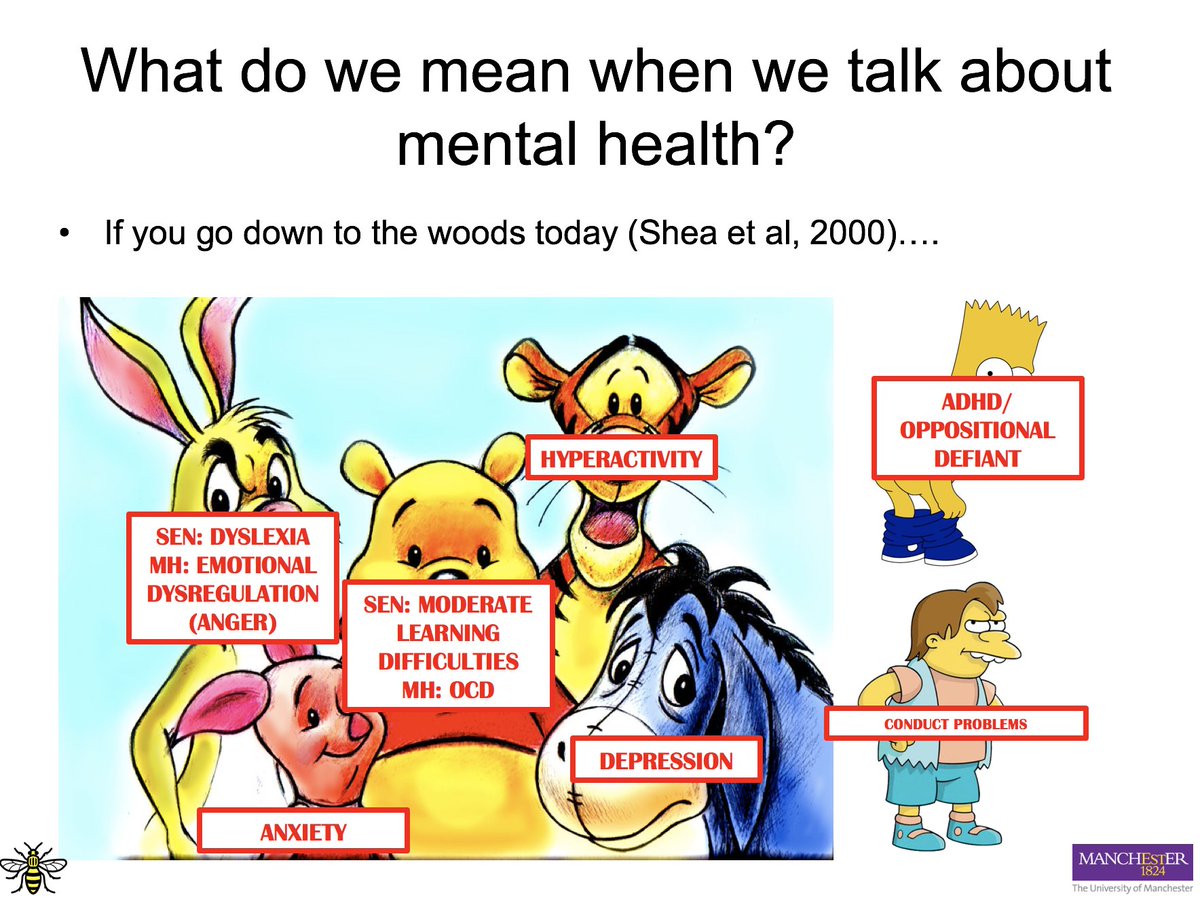Winnie The Pooh: Unpacking Mental Health In The Hundred Acre Wood
Have you ever wondered why certain characters in children's stories resonate with you more than others? It's because these characters, often unintentionally, mirror the complexities of human mental health, providing a safe and accessible way to explore difficult emotions and conditions.
The Hundred Acre Wood, the setting for A.A. Milne's beloved Winnie the Pooh stories, is populated by characters who each possess distinct personalities and quirks. While the stories never explicitly label these traits as mental illnesses, their behaviors often align with real-world psychological patterns. This has led to the enduring "Winnie the Pooh mental health" theory, which suggests that each character embodies a specific mental health condition. From Eeyore's pervasive sadness to Tigger's boundless energy, the inhabitants of the Hundred Acre Wood offer a fascinating lens through which to understand and destigmatize mental illness.
| Character | Possible Mental Health Representation | Traits and Behaviors |
|---|---|---|
| Winnie the Pooh | Eating Disorder (specifically, Binge Eating Disorder) | Obsessive focus on honey, difficulty controlling consumption, potential comfort-seeking through food. |
| Piglet | Generalized Anxiety Disorder | Frequent worry, nervousness, hesitation, reliance on Pooh for reassurance. |
| Eeyore | Depressive Disorder | Pessimism, low energy, chronic sadness, feelings of worthlessness. |
| Tigger | Attention Deficit Hyperactivity Disorder (ADHD) | Hyperactivity, impulsivity, difficulty focusing, excessive enthusiasm. |
| Rabbit | Obsessive-Compulsive Disorder (OCD) | Need for order and control, rigid routines, anxiety when things are out of place. |
| Owl | Narcissistic Personality Disorder (speculative) | Tendency to be pedantic, excessive focus on intelligence, inflated sense of self-importance (though often well-meaning). |
| Christopher Robin | Schizophrenia/Childhood imagination | May encompass signs and symptoms from all of these mental health |
| Kanga | Anxiety | Overprotective |
| Roo | He is known for his cheerful and compassionate personality and is someone that Pooh and his friends respect and care for. | No mental health issues, always cheerful |
The enduring appeal of Winnie the Pooh lies, in part, in the relatability of its characters. We see aspects of ourselves, or those we know, in their struggles and triumphs. The theory of winnie the pooh mental health underscores the value of destigmatizing mental illness. By viewing these beloved characters through a psychological lens, we not only deepen our appreciation of Milnes work but also contribute to breaking the stigma around mental health. The characters in the Hundred Acre Wood each see the world in their own waysome are restless, some anxious, some quiet and sad. Some characters we may feel a certain attraction or closeness too but why is that? These childrens fiction characters are also excellent representations of what different mental illnesses and struggles can look like.
- Meet Courtney Taylor Olsen Facts About The Olsen Familys Hidden Sister
- The Untold Story Of Band Of Brothers Captain Sobel Fact Vs Fiction
Let's delve into the individual characters and explore the mental health conditions they may represent:
Winnie the Pooh: The Comfort Seeker
Pooh's insatiable appetite for honey has led many to suggest he represents an eating disorder. Specifically, his behavior aligns with Binge Eating Disorder, characterized by a 'disorder in which you frequently consume unusually large amounts of food and feel unable to stop eating.' While his love of honey is often portrayed as a charming quirk, the underlying compulsion and lack of control can be seen as indicative of a deeper issue. He often seeks solace and comfort in food, turning to honey whenever he's feeling down or anxious. This emotional eating pattern is a hallmark of certain eating disorders. The importance of destigmatizing mental health and eating disorders cannot be overstated, and viewing Pooh's behavior through this lens can spark important conversations about seeking help and support.
- Dd Osama Age Real Name Rise To Fame 2024 Update
- Jimmy Butler Kaitlin Nowak Kids Relationship Drama More
Piglet: The Anxious Companion
Piglet is perhaps the most easily identifiable character in terms of mental health representation. His constant worry, nervousness, and general fearfulness are classic symptoms of Generalized Anxiety Disorder (GAD). Piglet frequently relies on Pooh for reassurance and is often paralyzed by his anxiety, hesitant to participate in adventures and new experiences. His small size and timid nature further amplify his vulnerability, making his struggles all the more relatable to those who experience anxiety. Piglet's journey highlights the importance of support systems and coping mechanisms in managing anxiety.
Eeyore: The Depressive Soul
Eeyore, the perpetually gloomy donkey, is often seen as representing depression. His low energy, pessimism, and chronic sadness are textbook symptoms of depressive disorder. He rarely expresses joy or enthusiasm, and his outlook on life is consistently bleak. Eeyore's struggles resonate with those who experience the debilitating effects of depression, emphasizing the importance of recognizing and addressing the condition. Analyze his traits, the creator's perspective, and the impact on mental health discussions surrounding depression.
Tigger: The Hyperactive Dynamo
Tigger's boundless energy, impulsivity, and difficulty focusing point to Attention Deficit Hyperactivity Disorder (ADHD). He's always bouncing around, interrupting conversations, and struggling to stay still. While his enthusiasm is often infectious, his lack of control and disregard for personal space can be disruptive. Tigger's character highlights the challenges faced by individuals with ADHD and the importance of understanding and accommodating their unique needs.
Rabbit: The Order Obsessed
Rabbit's meticulous nature, rigid routines, and need for control suggest Obsessive-Compulsive Disorder (OCD). He's constantly organizing his garden, enforcing rules, and becoming anxious when things are out of place. His obsession with order stems from a deep-seated need to control his environment and alleviate anxiety. Rabbit's character illustrates the often-debilitating effects of OCD and the importance of seeking treatment to manage the condition.
Owl: The Wise Or Is He?
Owl's characterization is more nuanced, but some have suggested he may represent aspects of Narcissistic Personality Disorder. While he's often seen as the wise and knowledgeable figure in the Hundred Acre Wood, his tendency to be pedantic, his inflated sense of self-importance, and his excessive focus on his own intelligence can be interpreted as narcissistic traits. However, it's important to note that Owl's intentions are generally good, and his flaws are often played for comedic effect.
Christopher Robin: The Narrator, or Something More?
Christopher Robin is a unique case, as he is the only human character in the Hundred Acre Wood. Some interpretations suggest that he represents the imagination of a child, while others propose a more complex psychological explanation. One theory suggests that Christopher Robin is a Schizophrenic with childhood imagination. In Milnes books represents a different psychological disorder. His ability to interact with the animals and his creation of the entire world could be viewed as a symptom of a dissociative disorder. May encompass signs and symptoms from all of these mental health. It is not a true depiction of winnie the pooh.
Kanga and Roo: Anxiety and Cheerful Compassion
Kanga can be seen as an overprotective and overly anxious mother, constantly worrying about Roo's safety. Roo on the other hand is cheerful and is known for his cheerful and compassionate personality and is someone that Pooh and his friends respect and care for.
The "Winnie the Pooh mental illness" theory is not intended to be a definitive diagnosis of the characters, but rather a thought-provoking exploration of how mental health can be represented in literature. Reading winnie the pooh through a new lens may help. By examining the characters through this psychological lens, we can gain a deeper understanding of mental health conditions and the importance of empathy and support. And when you think about it, it is quite possible. From the downbeat, depressive nature of eyeore to the upbeat, hyperactive nature of tigger, each character has a distinct and noticeable personality.
The popularity of this theory is evidenced by the emergence of online quizzes and discussions, such as the viral "Pooh Pathology Test," which claims to identify the mental health disorder a person resembles based on their favorite Winnie the Pooh character. Now, a new quiz called the 'pooh pathology test' is going viral on social media. The test claimed that it can determine the mental health disorder a person is suffering from based on the character from the classic cartoon franchise, 'winnie the pooh', they resemble the most. The quiz has taken over the internet and users have been posting the.
Another example of psychological disorders in disney movies is from the beloved tales of winnie the pooh (milne, 1954). In fact, here we see two examples: Eeyore displays signs of depression while tiggers behaviors seem consistent with a diagnosis of attention deficit hyperactivity disorder (adhd).
Ultimately, the Winnie the Pooh stories offer a valuable lesson in acceptance and understanding. Each character, with their unique quirks and challenges, is accepted and loved by the others. This message of inclusivity is particularly relevant in the context of mental health, where stigma and discrimination often prevent individuals from seeking help and support. This week emily and her friend bryarly dive into one of our favorite children's shows: Diagnosing winnie pooh characters mental disorders: Not only is it a joy to be able to say do not disturb, i'm reading winnie the pooh for research! but i was also reminded of why the bigger picture in mental health is important. A fan theory suggests winnie the pooh and friends each have a mental illness. Let's break it down and find out.psychmedia aims to bring you bit, it can be stated that each of the main characters resemble a mental illness. As with many cartoons, winnie the pooh has been the subject of many theories over the years. Have a look at this one, which pertains to mental health.
Milnes magical collection of winnie the pooh stories, new generations still fall in love with this yellow bear whos obsessed with honey. Finally, a psychoanalytical perspective examines the unintended depiction of winnie and his friends to represent different psychological disorders. Let us look at winnie the pooh and his friends from an intriguing perspective of mental health disorders.
Humorists have suggested that a. Your first step in this assignment is to read the brief (meant to be silly) article: E., gordon, k., hawkins, a., kawchuk, j., & smith, d.
What mental health conditions do winnie the pooh characters represent? Winnie the pooh, a beloved childrens character created by a.a. Milne, has captivated audiences with his endearing personality and heartwarming adventures in the hundred acre wood. Explore the melancholy of winnie the pooh's beloved character, eeyore, and delve into the discussion of his potential depression.
- Emmas Fortune Net Worth Of Watson Chamberlain More
- Taurus Scorpio Friendship Compatibility Challenges More

Pooh Pathology Test

Psychological Disorders Winnie The Pooh

Every Winnie The Pooh Character Represents A Disorder vrogue.co